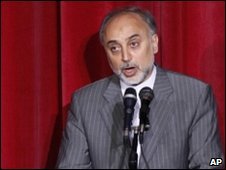 Iran called on staunch ally Syrian President Bashar al-Assad Sunday to hold free elections and allow multiple political parties to operate in the country, but said he must be given time to implement these reforms.
Iran called on staunch ally Syrian President Bashar al-Assad Sunday to hold free elections and allow multiple political parties to operate in the country, but said he must be given time to implement these reforms.
Iran had at first wholeheartedly supported Assad’s hardline stance against the 10 months of popular protests that have called for an end to his leadership.
It has since tempered its rhetoric as the uprising has dragged on and international pressure has risen, although it condemns what it calls foreign interference in Syrian affairs.
“They have to have a free election, they have to have the right constitution, they have to allow different political parties to have their activities freely in the country. And this is what he has promised,” Iranian Foreign Minister Ali Akbar Salehi said at a news conference on the sidelines of an African Union summit in the Ethiopian capital Addis Ababa.
“We think that Syria has to be given the choice of time so that by (that) time they can do the reforms,” said Salehi, whose country is an observer state at the AU and has said that strengthening ties with the AU is a foreign policy priority.
Syria has said it will hold a referendum on a new constitution soon, before a multi-party parliamentary election that has been much postponed. Under the present constitution, Assad’s Baath party is designated as “the leader of the state and society.”
The United Nations said in December more than 5,000 people had been killed in the protests and crackdown. Syria says militants have killed more than 2,000 security force members.
Arab League chief Nabil Elaraby will brief the U.N. Security Council to seek support for an Arab peace plan that calls on Assad to step aside.
But Salehi warned against a scenario that would leave a power vacuum in Syria, which borders Lebanon, Iraq, Turkey, Jordan and Israel.
“If any vacuum happens suddenly in Syria, nobody can anticipate the outcomes … the consequences could be even worse because there may be internal wars, internal clashes between people,” Salehi said.
“We have to avoid the worst and give enough chance to the government of Syria to carry on with its reforms.”
Non-Arab, Shi’ite Muslim Iran has backed “Arab Spring” uprisings that toppled several Western-allied dictators in predominantly Sunni Muslim North Africa, while maintaining support for Assad, a member of the minority Alawite sect, an offshoot of Shi’ite Islam.
Facing its own dispute with the West over its nuclear program, it could become increasingly isolated if Assad were to fall.
Confronted with mass demonstrations calling for an end to his rule, Assad launched a military crackdown to subdue the protests. Growing numbers of army deserters and gunmen have joined the demonstrators.
“We cannot deny that some people in Syria, a portion of people in Syria are looking for their legitimate rights just like any other people in any other country,” Salehi said.
“But we also cannot deny the outside interferences in Syria,” he said, citing reports of weapons that are being smuggled into Syria from neighboring countries.

Leave a Reply
You must be logged in to post a comment.